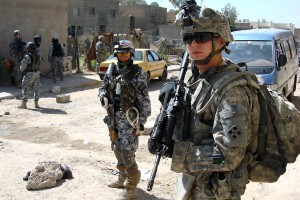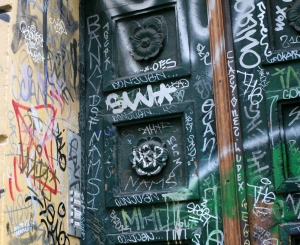By: Valarie Clark

Why is it that over 40% of bisexual people have considered suicide? The answer is a complex one, and I do not intend to speak for all bisexuals when I tell you a little of my own story. I can speak to a few of the reasons that will resonate with folks who have been raised in a religiously conservative, fundamentalist household. My parents are die-hard Wesleyans (a conservative branch of Methodists) and as such are fairly typical conservative evangelicals.
From the time I was old enough to read and write, my parents taught me that I am responsible for my “sinful” behavior and that this behavior is part of a hierarchy of sins. In the Wesleyan church and in many other conservative evangelical denominations, my sins are ranked according to degree of depravity. What is the most depraved of all sins? That honor goes to homosexuality. Running a close second and third are abortion and pre-marital sex. If you engage in any of the triumvirate of those heinous sins, most likely you will be disowned, threatened, condemned, and/or assaulted. Abortion and pre-marital sex are sins that you can repent a little more easily. Once you are “forgiven” for them, you can move on with your good Christian life, most likely with no tangible scarlet A to mark you as a baby-killing adulteress for life. Homosexuality, on the other hand, is not so easily hidden away. Vast amounts of resources are dedicated to eradicating this most depraved sin as evidenced by the existence of organizations like Exodus International and their ilk. If you engage in homosexual behavior, the stain of it will always be with you in some way, so you see those who have undergone some form of reparative therapy constantly having to pronounce themselves free of sin. They are never allowed to forget, by the evangelical Christian community, just how degenerate they once were – just one depraved thought away from falling back into sin.
This is the environment of fear within which I was raised. If I slipped and did something sinful, it was much better to indulge in something trivial, such as lying; vanity; swearing; or disobeying my parents, for instance. All of those lesser sins are quite easily forgiven and forgotten. I remember thinking each day that I must keep a close tally on all of my sins to be certain I asked for forgiveness for each one. When I was a young child, I never wanted to risk going to hell for one of those little sins. As far as homosexuality was concerned, I hardly knew of its existence until I was an adolescent. How could one know anything about it, if sex was never discussed? Homosexuality was a dark, mysterious, unfathomable, and loathsome sin.
Enter my “depraved” desires, and you have a recipe for disaster in the form of depression. For the most part, I kept my desires to myself – denying, even to myself, that I ever thought about such things. It wasn’t until years later, when I was out of my parent’s household and on my own, that I allowed myself to think outside the box of heterosexual desire. I certainly, at that time, had no name for my desires other than “sin,” “depravity,” “unnatural.” When I finally realized that my desires were not going away, no matter how I tried to hide them, and when I finally became okay with that, it was a welcome time of self-discovery. But my journey out of the closet had just begun.
You see, bisexuals often have an unfathomably deep closet to make their way out of. I’ve been told my entire life, that I am responsible for my behavior and that it is my fault should I choose to indulge in sin. When I moved beyond that rubric, I was able to accept the commonly held belief by the LG community, that I was “born this way” and there is nothing I can do about it. Happiness, acceptance, and joy suddenly entered my life, right? Wrong. If anything, once I began to understand the complexity of my desires, assuming a strictly biological imperative that determined my bisexuality was simultaneously liberating and problematic for me. If I was “born this way” then didn’t I need to prove I was by choosing partners who would demonstrate to the LG community and to the world that I was truly bisexual? Didn’t I need to provide details of my romantic and sexual history so the LG community could scrutinize it and let me know if I measured up? Otherwise I could easily be shoved back in the closet or welcomed into the lesbian community, if I wasn’t bisexual enough. After all, it would be so much easier to admit I was one or the other, wouldn’t it? Once again, I was trying desperately to fit into someone else’s definition of who I am. At first, I was never a good enough Christian and now I was convinced I would never be a good enough bisexual. Who would want to live like that? I certainly did not.
Depression and thoughts of suicide crept back in again. I wasn’t good enough for the straight community; worse yet, I felt I wasn’t good enough for the LG community. Depression is, perhaps oddly, a comfortable place for me because I escape by sleeping too much and eating too little and feeling next to nothing. It’s an almost-dead or not-really-alive state for me. The further I fall into it, the closer to death I get and the closer I get to an escape from the torment of life. After coming out as bisexual and finding virtually no community, death would have allowed escape from the torment of being questioned and silenced by those who I thought would be allies. And where was the bisexual community when I needed it? That’s a good question, isn’t it? If you are wondering about that, take a look again at the statistics on suicide. Over 40% of us have considered suicide. How can we form a stable community when we are struggling just to live in this world?
Does my story make you uncomfortable? It should. Are you looking for a happy ending? It’s not there, and it’s a story that is shared by many other bisexuals like me. There are other reasons the rates of suicide are so high in the bisexual community. There are more stories that need to be told – more voices that need to be heard. This statistic is shocking, but seeing it is only a first step. Now we need to find and explore root causes and address them. Otherwise we will keep losing people who self-destruct, rather than survive as a community that is rejected, belittled, and ultimately silenced by the more powerful and vocal monosexual communities.
_______________________________________________________________________________________________________
For more information, see: http://radicalbi.wordpress.com/2011/09/19/snippet-4-the-bisexual-invisibility-report/
Bisexuality, Sin and Self-destruction,




benjamino
20 Jun 2013I personally can’t relate to your upbringing, but I identified with the idea of not fitting into either community. My upbringing was always more about ridicule from straight people than shame over “sinfulness,” and to this day that’s the thing that bothers me most. Gay people tend to deny my existence– I’m “too straight”– and straight people still tend to ridicule the idea of me liking men. It’s regretful, but I have actually found a degree of comfort around Christian ex-cons who love and tolerate me because they (misguidedly) see my bisexuality as symptoms of the same problem that they are unable to eliminate in themselves.